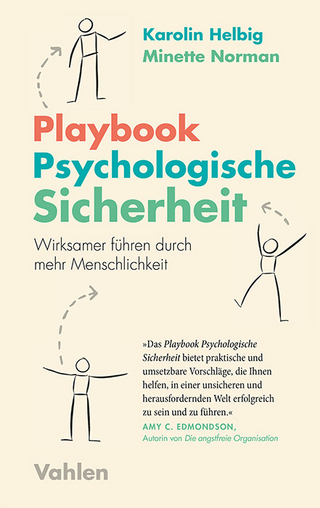
An Introduction to Contemporary Work Psychology
Wiley-Blackwell (Verlag)
978-1-119-94552-9 (ISBN)
AN INTRODUCTION TO CONTEMPORARY WORK PSYCHOLOGY
"[This book] provides a comprehensive introduction to the field, featuring contributions from around the world. Not only is the book well-written, it is also very readable and entertaining and provides a thorough and scholarly introduction to all aspects of the field. I strongly and unreservedly endorse and recommend it."
—Anthony Harold Winefield, PhD, Professor of Psychology, University of South Australia
"Work behaviour is crucial to our health and well-being and to organizational performance. Work also impacts on our behaviour outside work and on family life. With contributions of many of the world's leading experts, this strong editorial team has produced the first standard book on work psychology: the scientific study of work behaviour and its antecedents and consequences. It is a must for anyone seriously interested in work, work behaviour and people at work."
—Michiel Kompier, Professor of Work and Organizational Psychology, Radboud University Nijmegen
An Introduction to Contemporary Work Psychology is the first textbook to provide a comprehensive overview of work psychology. Moving beyond the terrain of introductory industrial/organizational psychology textbooks, this book examines the classic models, current theories and contemporary issues affecting the twenty-first-century worker.
This text covers all aspects of the psychology of working, including topics such as safety at work, working times, work–family interaction, recovery from work, technology, job demands and job resources, working in teams and sickness absence. While many books in the field focus on the adverse effects of work, this one is unique in emphasizing also the positive aspects and outcomes of work, including motivation, performance, creativity and engagement. The book also contains chapters on job-related prevention and intervention strategies with a special focus on positive interventions and proactive techniques, such as job crafting and promoting positive work behaviours.
Edited by respected leaders in the field and with chapters written by a global team of experts, this is the textbook for advanced undergraduate and graduate courses focusing on work psychology.
Maria Peeters is Associate Professor of Work and Organizational Psychology at Utrecht University, The Netherlands, and a licensed occupational health psychologist. Her research interests include job stress, work motivation, job performance, work-home interaction, and aging at work. She has published many book chapters as well as articles on these topics in today’s leading scientific journals. Jan de Jonge is Professor of Work and Organizational Psychology at Eindhoven University of Technology, The Netherlands, and Vice-Dean of the Department of Industrial Engineering and Innovation Sciences. He is a licensed work and organizational psychologist as well as a licensed occupational health psychologist. His research interests include the optimization of performance at work and at sports, and he has published well over a hundred articles, books and chapters. Until recently, he served as the Editor of the Journal of Occupational and Organizational Psychology. Toon Taris is Professor of Work and Organizational Psychology at Utrecht University, The Netherlands. He is currently Scientific Editor of Work & Stress and serves on the boards of several other international journals. He has published hundreds of articles and chapters on topics such as occupational health, stress, engagement, workaholism, authenticity at work, as well as on longitudinal research methods and nonresponse, in journals such as Journal of Applied Psychology, Journal of Organizational Behavior, Journal of Vocational Behavior and the Journal of Occupational Health Psychology.
About the Editors vii
About the Contributors viii
Part A Introduction 1
1 Introduction: People at Work 3
Maria C. W. Peeters, Toon W. Taris and Jan de Jonge
2 Research Methods in Work Psychology 31
E. Kevin Kelloway and Arla Day
Part B Theoretical Perspectives on Work 61
3 The Models that Made Job Design 63
Kevin Daniels, Pascale M. Le Blanc and Matthew Davis
4 Current Theoretical Perspectives in Work Psychology 89
Jan de Jonge, Evangelia Demerouti and Christian Dormann
Part C Demands 115
5 Quantitative Job Demands 117
Marc van Veldhoven
6 Qualitative Demands at Work 144
Dieter Zapf, Norbert K. Semmer and Sheena Johnson
Part D Context 169
7 Job Control and Social Aspects of Work 171
Norbert K. Semmer and Terry A. Beehr
8 Recovery from Demanding Work Hours 196
Sabine A. E. Geurts, Debby G. J. Beckers and Philip Tucker
9 The Design and Use of Work Technologies 220
Patrick Waterson
Part E The Worker 241
10 Individual Characteristics and Work-related Outcomes 243
Beatrice van der Heijden, Karen van Dam, Despoina Xanthopoulou and Annet H. de Lange
11 Work–Family Interaction 267
Ulla Kinnunen, Johanna Rantanen, Saija Mauno and Maria C. W. Peeters
Part F Outcomes 291
12 Burnout, Boredom and Engagement in the Workplace 293
Wilmar B. Schaufeli and Marisa Salanova
13 Job Satisfaction, Motivation and Performance 321
Nathan A. Bowling
14 Safety at Work 342
Nik Chmiel and Toon W. Taris
15 Sickness Absence and Sickness Presence 367
Rita Claes
Part G Interventions 391
16 Managing Psychosocial Risks in the Workplace: Prevention and Intervention 393
Silvia Pignata, Caroline Biron and Maureen F. Dollard
17 Job Crafting 414
Evangelia Demerouti and Arnold B. Bakker
18 Teams at Work 434
Amanda L. Thayer, Ramón Rico, Eduardo Salas and Shannon L. Marlow
19 Positive Interventions: From Prevention to Amplification 458
Carolyn M. Youssef-Morgan and Dale A. Sundermann
Index 481
| Erscheint lt. Verlag | 29.11.2013 |
|---|---|
| Verlagsort | Hoboken |
| Sprache | englisch |
| Maße | 199 x 254 mm |
| Gewicht | 1039 g |
| Themenwelt | Geisteswissenschaften ► Psychologie ► Arbeits- und Organisationspsychologie |
| Medizin / Pharmazie ► Medizinische Fachgebiete ► Psychiatrie / Psychotherapie | |
| Wirtschaft ► Betriebswirtschaft / Management | |
| ISBN-10 | 1-119-94552-6 / 1119945526 |
| ISBN-13 | 978-1-119-94552-9 / 9781119945529 |
| Zustand | Neuware |
| Haben Sie eine Frage zum Produkt? |
aus dem Bereich


